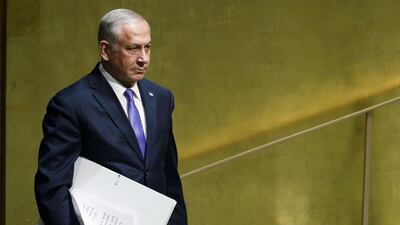“When elephants fight, it is the grass that suffers.” The proverb might have originated in East Africa, but it can be seamlessly applied to Lebanon. Again and again, the people of this small nation have fallen prey to the exploits of regional powers. And today it is the rivalry between the most destabilising powers in the Middle East, Israel and Iran, which has spilled onto the streets of Lebanon.
Meanwhile, garbage is piling up, efforts to formulate a government lie in tatters and even middle-class families go without power for long stretches of the day.
Israeli Prime Minister Benjamin Netanyahu used his platform at the United Nations General Assembly last week to accuse Iran-backed Hezbollah of building secret sites to store missiles “that can target deep inside Israel within an accuracy of 10 metres”.
In his now habitual style, Mr Netanyahu held large visual cues aloft as he addressed delegates. The accusations led Lebanese Foreign Minister Gebran Bassil to parade international diplomats around the suspected sites.
If confirmed, missile sites would endorse the reigning view of Hezbollah in this region. The group sought political legitimacy following a strong electoral performance in May, but it is, in fact, a violent militia determined to hold Lebanon hostage at the behest of Tehran. It is symbolic that alleged missile sites are said to lie near Beirut airport, which the Israelis bombed in 2006 to diminish support for Hezbollah and which is named after Rafik Hariri, the former president Hezbollah is accused of killing. Because behind this issue is an intractable dispute between Israel and Iran.
Twenty-eight years on from its civil war, Lebanon is in disarray, blighted by the complete paralysis of state institutions. Chaos rules in Lebanese politics, which are riddled with crony capitalism, propelling unscrupulous third parties to fill vacuums in governance. It is a powerful indicator of Lebanon’s malaise, for instance, that the so-called “generator mafias” have threatened to cut power to millions of Lebanese households if the electricity industry is regulated. Meanwhile, the country that once lumbered on for 29 months without a government is no closer to forming one today, six months after national elections. Of equal, if more distant, concern is the prospect of a banking crisis in Lebanon, which is today the world’s third most indebted nation. Its budget deficit is greater than that of Greece before its bailout and its banks can only keep the country afloat for so long. Add to that the burden of a million Syrian refugees and the true scale of the crisis becomes clear.
And yet at this critical moment, the Lebanese people are again reminded of the irrelevance of their plight to those holding real power. Until Israel and Iran stop using the fragile state as an arena for their proxy war, any hopes of a functioning Lebanon will be non-existent.

